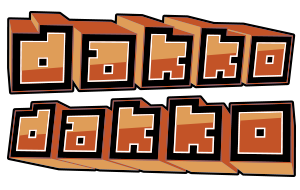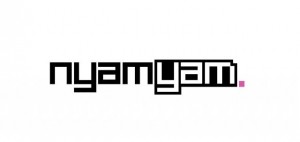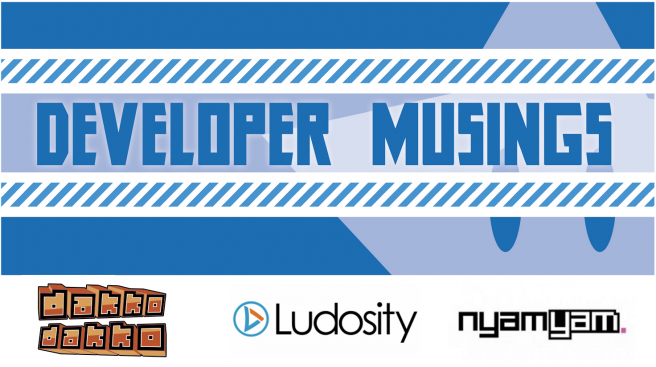[Developer Musings] Hands-off Helpfulness: three independent developers talk about working with Nintendo
Posted on June 29, 2014 by Brian(@NE_Brian) in Developer Musings, Wii U eShop
Being a developer that works with Nintendo has, in the past, been considered something of a novelty for independent companies. Before WiiWare existed on Wii there wasn’t much of a way to get your game published on a Nintendo platform without a “proper” publisher, and even with Nintendo’s digital offerings on Wii and DSi things remained relatively closed off.
Now, with Wii U and 3DS, game development is open and independent developers have brought out masses of titles to the two platforms. But what’s it like to work with Nintendo? Is there any hint of their shielded past nowadays, or have things loosened up so much that such a past is indistinguishable?
“Willing to help” seems to be the common theme across all three of our entries in this week’s ‘Developer Musings’ series. Of course, there does seem to be some of that traditional red tape still involved– head past the break for comments from Dakko Dakko (Scram Kitty), Ludosity (Ittle Dew), and Nyamyam (Tengami).
(Unsure as to what Developer Musings is about? Check out our first entry here for an explanation.)
Rhodri Broadbent – Dakko Dakko

Previous Works: In April, Dakko Dakko released Scram Kitty and his Buddy on Rails. Other titles from the studio include Floating Cloud God Saves The Pilgrims and The HD Adventures of Rotating Octopus Character.
Upcoming Games: No upcoming games have been revealed, but stay tuned for announcements in the future!
Working with Nintendo has been a really enjoyable experience for us at Dakko Dakko. Right from the start we found their teams to be enthusiastic about what we wanted to make and really helpful, especially in the early stages with regard to getting us started on the Wii U hardware.
Our relationship with Nintendo on this project began before we’d even started development of ‘Scram Kitty and his Buddy on Rails’, and at the time I was considering bringing our next game to 3DS. It was, however, just at the time when information about Wii U was becoming more widely available, and the game I wanted to make seemed to fit even better on – and indeed started to grow around the ideas of – Wii U.
I really love the closeness and tactility made possible via handheld gaming, and so I was excited to bring all the power of a home console to a system that still had that versatility, flexibility and intimacy of a portable game system. In fact even now I think we’re still in the early stages – developers and players alike – of discovering the benefits of off-tv play and of having extra functions and viewpoints on a second screen.
Even when your gameplay doesn’t require the second screen (as with Scram Kitty), you can add character and flavour to the experience by using that second screen in fun ways. Creating the animated Scram Kitty character on the TV and adding in the guidance and commentary was a rewarding, inspiring challenge, and I feel it adds a lot of personality to the game. We could have gone much further with it if we had a bigger team… imagine if Scram Kitty was able to read out Miiverse comments from your friends on the same stage, for example! There’s a whole bunch of ideas we had to leave on the whiteboard for this game, but I feel that the potential for the two-screen experience is still all out there to be discovered and played with.
Because we are the publishers of the game as well as developers, we didn’t have regular or scheduled involvement with Nintendo once production was in full swing. That’s not to say we had no involvement with them at all though, quite the opposite; we were able to get a lot of useful feedback about the game from them whenever we asked for it, and we were very privileged to be included in their E3 presentation last year as well as in a Nintendo Direct broadcast. Their support for our title over the course of development was really strong, and very encouraging.
With regard to publishing the game on the eShop, each member of our team has published games for many platforms before, including digital stores, so with all that experience we were able to negotiate the submissions process very well. The eShop marketing team were always on hand when we wanted information about the process, creating all the assets for each region, and so on. Overall, whilst publishing is never a completely easy ride and there are many rules to follow, we were able to bring Scram Kitty and his Buddy on Rails to market surprisingly smoothly! In fact, based upon our very positive experiences, I’d expect to see many developers come back to work on Nintendo platforms and the eShops again and again.
Joel Nyström – Ludosity

Previous Works: Along with Ittle Dew, which hit Wii U about a month ago, Ludosity has released a bunch of titles. On 3DS, the studio created Boulder Dash XL 3D and Alien Chaos 3D.
Upcoming Games: What Ludosity has in store for the future is currently unknown at present!
Nintendo are very helpful, but of course they can only help you if you reach out to them. We have been through submission (or Lotcheck as Nintendo calls them) with three different titles now, and have never had any major problems. If you just read up on the guidelines beforehand you should be able to check off most things in the first round.
That said, there are a lot of red tape involved too, and sometimes you can roll your eyes about some of the things they react on. You also need to watch out for the insanely varying degree of technical competence between different coworkers with publishers (not just Nintendo) – especially with marketing folk =) For example, I have now learnt to never ever send a direct link to a video they need to download – since it just opens in their browser when they click on it and they don’t know where to go from there.. But on the other hand, the technical support they have is awesome, so you just have to learn who does what over there =)
With Ittle Dew, we decided to port to Wii U pretty late in the development. It was when they announced their partnership with Unity and that developers got a license for free with the purchase of a devkit. However, Unity wasn’t actually done when we started porting, so we had to use beta builds, and we waited for a very long time on the go-ahead to submit a game built with Unity.
Phil Tossell – Nyamyam

Previous Works: Nyamyam launched Tengami ealier this year. It was the first title for the company.
Upcoming Games: Nyamyam is currently wrapping up work on the Wii U version of Tengami.
It was at IndieCade in 2012 that our relationship with Nintendo first began. Just by a chance encounter Dan Adelman from Nintendo US stopped by our stand where we were showing Tengami on the iPad. This led to a initial conversation that planted the first seeds for potentially bringing the game to the WiiU. However once the excitement of IndieCade faded and we set about doing more work on the iPad version, this idea quickly faded from our minds due to the amount of things we had going on. It was only when a surprise email from Tim at Nintendo Europe arrived some weeks later that things really started in motion.
From the outset Nintendo were very helpful in getting us up and running on WiiU development. They offered us two development kits to get started on right away and they very quickly shipped these over to us from America. The only initial hurdle we had to jump came from an old rule that required a permanent office in order to have development kits. As an indie developer we didn’t have an office, but we were told that Nintendo planned to change this rule very soon. We had to be a little patient while they sorted through this, but no sooner was this rule changed then we received our development kits. Nintendo overall are very hands off with us, but they are always there if we need some help around the various processes that you have to undergo. I think it greatly helped us that I’d worked with Nintendo for many years while at Rare, and so I was familiar with a lot of the things that were required.
Porting the game to the WiiU has been very smooth. The hardware is perfectly capable and especially since we are porting up to more powerful hardware than the iPad then it has made for a very straightforward process. I think the main areas that Nintendo could improve on are their development tools which on the whole are somewhat lacking in comparison to, for example, Apple’s development environment. I think they are well aware of this and there have been some steps toward improving some of the most awkward aspects. There is also a lot more form filling and extra steps such as ratings that have to be done which makes it considerably more work than publishing on mobile platforms.
Nintendo Everything would like to thank Rhodri Broadbent, Joel Nyström, and Phil Tossell for their valuable insight and for taking the time to contribute to our feature.
